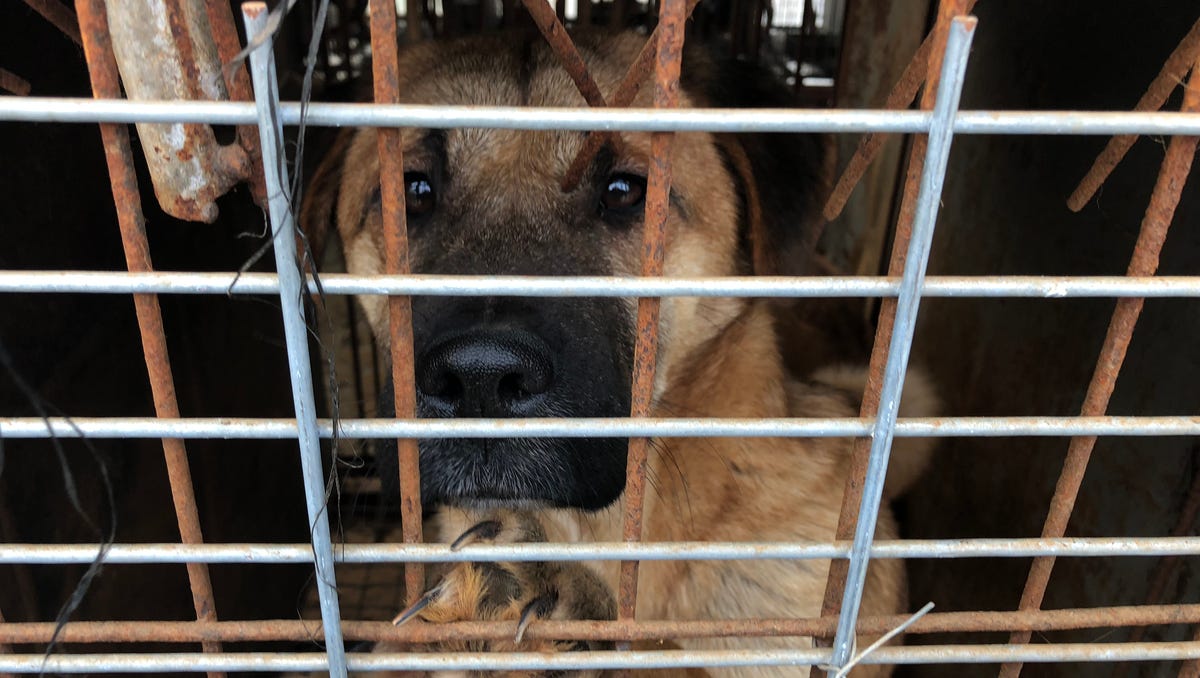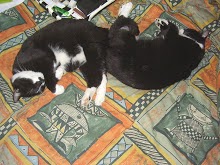De honden worden gehouden in veel te kleine kooien, de arme dieren moeten op roosters staan en liggen, in hun eigen poep en urine.........
Opvallend: positief nieuwszender Radio1 heeft een aantal journalisten in Zuid-Korea, die dagelijks ook wat Zuid-Koreaanse propaganda tripjes maken en ten gehore brengen op die zender, echter altijd met 'leuke weetjes' en vooral geen negatieve berichtgeving, zeker niet over de honden- en kattenvleeshandel, al is Noord-Korea schoppen 'natuurlijk' wel toegestaan.....
Begrijp me goed als je van sport houdt en dan m.n. deze winter spelen, geniet er vooral van (al kan ik me er niets bij voorstellen), maar dat deze grootschalige marteling van dieren die wij hier als huisdieren houden en waar we alles voor overhebben, niet enorme aandacht heeft gegenereerd bij de reguliere media is een grof schandaal!
Lees het volgende artikel, bekijk de video's en geeft het ajb door aan familie, vrienden en bekenden, teken alsnog de petitie als je dit nog niet hebt gedaan:
Inside the grim scene of a Korean dog meat farm, just miles from the Winter Olympics
MARTIN
ROGERS |
USA TODAY SPORTS
Updated 1:11 p.m. GMT+1
Feb. 12, 2018
Just 25 miles away from the olympics, the painful sight of Korea's dog meat trade is laid bare
WONJU, South Korea – A
short drive from the burning Olympic torch and the excited throng of
Winter Games spectators, there was no cheering outside the place
where hundreds of dogs are packed in cages until they are killed for
their meat.
In the rural region of
Wonju, down a winding country lane, sits a farm that provides dog
meat to some of the thousands of South Korean restaurants where
patrons order things such as dog salad, dog ribs, dog stew and dog
hot pot.

A dog looks out from a cage at a dog farm in South Korea.
SANDY HOOPER, USA TODAY SPORTS
The grim surroundings of
the farm pains the senses. The first thing to be noticed is the
sound, pitiful whines and yelps of about 300 animals being kept in
filthy cages until their execution.
Step closer and the
stench fills the nostrils, a sickening waft that spreads over two
long rows of cramped cages.
Some of the dogs do not
survive long enough to be slaughtered. Lying discarded on the mud
floor by the plastic awning, the carcass of a dead Tosa – a rare
breed that originated in Japan. Also in the cages were Jindos, St.
Bernards and golden Labradors.
Most
were emaciated. Many had gaps in their fur where huge sores grew on
their bodies. The cages are elevated, set up so dog feces drops
through gaps in the wire bottom, collecting in huge piles beneath.
USA TODAY video
journalist Sandy Hooper and myself filmed the gruesome scene for 15
minutes on Saturday morning, using GoPros and iPhones. When we
approached the front of the property in an attempt to speak to the
owners, a man screamed in Korean: "Turn it off, otherwise I’m
going to throw it down!”
The Winter Olympics is
supposed to be one giant commercial for South Korea and its winter
tourism industry, but no public relations effort can cast a favorable
light on the Korean dog meat industry. Pyeongchang organizing
officials were aware enough of the likely international reaction to
Korean dog meat eating practices that they paid nearby restaurants to
take down signs advertising the product’s availability and pleaded
with them to take it off the menu – at least during the Olympics.
It didn’t work. Two
miles from Jinbu station, the main hub serving the primary mountain
cluster of the Games, a trio of restaurants openly served dog
products. They had amended their frontage signs to remove the word
“bosintang” (dog meat stew) and promote goat meat instead, but
that was only outside.
Dogs claw at their cages as a third dog lies dead at a dog farm in South Korea, just 25 miles from the site of … Show more
SANDY HOOPER, USA TODAY SPORTS
Walk inside and glance up
at the giant white board and the first four menu items, in English
and Korean, are derived from man’s best friend. An elderly Korean
man removed his shoes, entered the room, ordered the stew and sat
down at a row of tables on the floor. Soon, he was served the thick
brown concoction and began slurping down the soup until it was all
gone.
In Korean culture, dog
meat is said to have mythical properties that boost restorative
powers and increase virility. Fearing a backlash from
traditionalists, the Korean government won’t amend the law, despite
president Moon Jae-In having adopted a dog saved from the meat
industry.
Pyeongchang organizers
wish government officials would take action.
“We
are aware of the international concern around the consumption of dog
meat in Korea,” an organizing committee statement read. “This is
a matter which the government should address. We hope that this issue
will not impact on the delivery or reputation of the Games and the
province and we will support the work of the province and government
on this topic as needed. Also, dog meat will not be served at any
Games venue.”
Eating dog meat is a
custom here and it is hard to dispute that. In the United States
millions of animals of countless varieties are slaughtered each year
for meat. To some, the plight of Korean dogs is scarcely any
different to that of American chicken, cows or pigs. To others, there
is something vastly different about a dog, given its relationship to
humans.
Activists
in Korea don’t like the use of dogs for meat but mainly focus their
protest efforts on the methods of killing the animals and their
conditions in captivity.
Two rows of cages that contain dogs that will be used for dog meat.
SANDY HOOPER, USA TODAY SPORTS
“If
the Korean people stop eating dog meat there will not be the market
for it,” Kim Jun-Won, president of the Dasom animal rights
organization said, fighting back tears when shown photographs of our
footage as we returned to our vehicle. “But this is wrong and it
breaks my heart. The people who keep animals this way and kill them?
They are the devil.”
Demand is decreasing,
with dog meat meals not particularly popular with younger members of
Korean society. As well as the one described above, USA TODAY Sports
visited two other farms in the area that showed signs of being
operational recently. Both were closed, with the dried feces and even
bones of deceased dogs still visible.
“The
problem is that while smaller facilities close due to lack of
business, larger, better organized ones are popping up,” Kiana
Kang, director of programs and special projects of American
non-profit rescue organization Animal Hope and Wellness said. “This
is the two Koreas. There is the beauty and the culture, and then
there is this.”
Korean dog farmers claim
their sole intention is to try to make a living and insist the
animals are the same as livestock.
A group of Winter Olympic
athletes, including Canadian figure skater Meagan Duhamel, freestyle
skier Gus Kenworthy and snowboarder Lindsey Jacobellis took part in a
recent public service announcement in a bid to raise awareness about
the Korean dog meat trade. Duhamel already owns a rescue Korean dog.
The
United States and Canada are leaders in trying to rescue Korean dogs
and provide them with a new life. In a recent
USA TODAY Sports interview, Californian couple Lana Chung Peck
and her husband Kevin Peck described how many of the animals they
foster and rehabilitate through the Save Korean Dogs organization
have significant issues.
Chung Peck said her dogs
cannot initially walk properly on grass or firm ground, because most
of their lives had previously been spent in the cages, scrambling to
get firm footing on the hard thin metal.
Meanwhile, at the Games,
the first medals were being doled out. The plight of Korea’s dogs
isn’t going to be the major narrative of the Games, the events
themselves and the lingering political turmoil dominate the
headlines.
But it is here, happening
not far from the Olympics, and it’s tough to stomach.
Originally
Published 12:24 p.m. GMT+1 Feb. 12, 2018
Updated
1:11 p.m. GMT+1 Feb. 12, 2018
Hier de link naar de petitie: Seoul, South Korea! Enforce the Ban on Despicable Dog Meat Trade-Close down Illegal Dog Slaughterhouses & Restaurants in Gyeongdong Market!
Voor de video in dit bericht, zie het originele artikel.
PS: opvallend weer dat PVV 'dierenvriend' Dion Graus de Kamer niet op stelten heeft gezet over deze vreselijke zaak..... Ook opvallend dat er amper beelden zijn te vinden over het grote aantal katten dat onder erbarmelijke omstandigheden wordt gehouden......

Kittens await their fate in a meat cage. Photo credit: SayNoToDogMeat.Net
Zie ook: 'Nederlands Olympisch team: spreek je uit tegen de Zuid-Koreaanse handel in honden- en kattenvlees! Teken ajb de petitie tegen barbaarse dierenmishandeling!'
en: 'Blokhuijsen onder druk gezet excuus te maken over opmerking barbaarse dierenmishandeling en eten van honden in Zuid-Korea........'
Mensen dat was het voor deze dag en ondanks dit bericht wens ik je (na ondertekening van de petitie) een mooie dag! (het weer zit alvast mee)
en: 'Blokhuijsen onder druk gezet excuus te maken over opmerking barbaarse dierenmishandeling en eten van honden in Zuid-Korea........'
Mensen dat was het voor deze dag en ondanks dit bericht wens ik je (na ondertekening van de petitie) een mooie dag! (het weer zit alvast mee)

Geen opmerkingen:
Een reactie posten